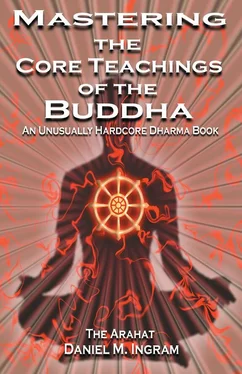Daniel Ingram - Mastering the Core Teachings of Buddha - An Unusually Hardcore Dharma Book
Здесь есть возможность читать онлайн «Daniel Ingram - Mastering the Core Teachings of Buddha - An Unusually Hardcore Dharma Book» весь текст электронной книги совершенно бесплатно (целиком полную версию без сокращений). В некоторых случаях можно слушать аудио, скачать через торрент в формате fb2 и присутствует краткое содержание. Год выпуска: 2009, ISBN: 2009, Издательство: Aeon Books, Жанр: Старинная литература, на русском языке. Описание произведения, (предисловие) а так же отзывы посетителей доступны на портале библиотеки ЛибКат.
- Название:Mastering the Core Teachings of Buddha - An Unusually Hardcore Dharma Book
- Автор:
- Издательство:Aeon Books
- Жанр:
- Год:2009
- ISBN:9781904658405
- Рейтинг книги:5 / 5. Голосов: 1
-
Избранное:Добавить в избранное
- Отзывы:
-
Ваша оценка:
- 100
- 1
- 2
- 3
- 4
- 5
Mastering the Core Teachings of Buddha - An Unusually Hardcore Dharma Book: краткое содержание, описание и аннотация
Предлагаем к чтению аннотацию, описание, краткое содержание или предисловие (зависит от того, что написал сам автор книги «Mastering the Core Teachings of Buddha - An Unusually Hardcore Dharma Book»). Если вы не нашли необходимую информацию о книге — напишите в комментариях, мы постараемся отыскать её.
Mastering the Core Teachings of Buddha - An Unusually Hardcore Dharma Book — читать онлайн бесплатно полную книгу (весь текст) целиком
Ниже представлен текст книги, разбитый по страницам. Система сохранения места последней прочитанной страницы, позволяет с удобством читать онлайн бесплатно книгу «Mastering the Core Teachings of Buddha - An Unusually Hardcore Dharma Book», без необходимости каждый раз заново искать на чём Вы остановились. Поставьте закладку, и сможете в любой момент перейти на страницу, на которой закончили чтение.
Интервал:
Закладка:
The Progress of Insight
are in re-observation, and shortly thereafter they are describing A&P
territory, meaning that they had just been in The Three Characteristics territory, not Re-observation. Continuing to investigate the true nature of these sorts of sensations and our map theories is often difficult, and this is a common cause of failure to progress.
Now, I am about to describe all sorts of emotional or psychological manifestations that can sometimes happen at this stage. The more extreme the description of a possible side-effect of this stage, the rarer that side-effect is likely to be, particularly those that sound like descriptions of mental illness. For someone who is staying at the level of bare sensate experience, as I strongly recommend, the only difficult manifestations that seem to be quite common are a strong sense of aversion to formal meditation and experience, and a deep sense of primal frustration, though these tend to fall quickly in the face of good practice, and if our concentration is strong enough and our other factors are in balance, we may move through this stage with no problem at all.
The aversion to meditation and experience are due to the fact that the vibrations by this point can be quite fast and harsh and the noise in our repetitive minds quite irritating. Some of my own descriptions of this stage while on retreat have included such phrases as “the mindstorm” and “a bracing work in D minor for six sense doors, hailstorm and stuttering banshee.” If we are very powerful meditators, it can literally feel as if we will be torn apart by these vibrations, and this is exactly what we are trying to accomplish. Even if the other odd manifestations do arise, if we are practicing well they should not last very long at all, at best minutes, at worst hours or days.
All of that said, and before I go on, those who are crossing this territory with strong concentration abilities and using some very rarefied object, such as a complex visualization on sacred geometry as one of many possible examples, may, if they are very good, pass through this stage with little or no difficulty at all, and all they may notice is that the thing gets wider and wider, the patterns get more complex and attain to wider, more spherical dimensions and perhaps many-fold symmetries, and that it comes around to encompass basically the whole field of experience, kind of like watching an IMAX movie of a moving
technicolor spirograph in the front row, or some similar thing. I use this 194
The Progress of Insight
example partly due to my own experiments and partly to illustrate general points. Different objects will produce different specifics, such as colors, images, etc., while some universal aspects of what happens during this stage will remain basically the same.
You see, Re-observation is actually all fluff and no substance, but if you confuse fluff for substance, the effect will be the same as if it actually had substance. It is like a toothless dog with a ferocious bark. If you run screaming or faint from fear when the dog barks, then it needed no teeth to prevent your progress. The corollary is that the primary sign that the negative side effects that may occur in the Dark Night are actually not associated with insight stages but instead are due to other processes is that they do not change much in the face of strong and accepting investigation or stopping practice entirely. That said…
This stage is sometimes called the “rolling up the mat stage” and is when many who joined monasteries in the stage of the Arising and Passing Away now give up and disrobe. People on retreats tend to need lots of reassurance and often leave right then even with good guidance and encouragement. There can be the distinct feeling that it is impossible to go forward and useless to go back, which is exactly the lesson they should learn. Acceptance of right here and right now is required, even if it seems that this mind and this body are quite unacceptable and unworthy of investigation. No sensations are unworthy of investigation!
One of the hallmarks of the early part of this stage is that we may begin to clearly see exactly what our minds do all day long, see with great clarity how the illusion of a dualistic split is even created in the first place sensation by sensation, moment to moment, but somehow there is not yet enough spaciousness of perspective and equanimity to make good use of this information. This can be very frustrating, as we wonder how many times we have to learn these lessons before they stick.
Great feelings of frustration and disenchantment with life,
relationships, sex, jobs, moral codes and “worldly” responsibilities may sometimes emerge at this stage in ways that can cause all sorts of disruption and angst. These aspects of one’s life can temporarily seem bland and pointless at this stage, though it may seem that this will always be the way one feels about them. This stage can mimic or perhaps 195
The Progress of Insight
manifest as some degree of clinical depression. Beware of making radical life changes that cannot easily be undone (such as a divorce), or firing off angry emails to your boss based upon the temporary feelings that may arise during this stage. For those that recognize that they are in this stage, some sort of active mental compensation for these potential effects can be helpful so as to keep one’s life functioning. It can help one appear more “together” than one feels, and thus maintain relationships, jobs, studies, etc. at some sort of functional level. This can be very skillful if it is also combined with practice that allows the experiences of this stage to be acknowledged and understood as well.
Layers of unhelpful and previously hidden expectation, pressure and anxiety can show their true uselessness, though this beneficial process can be very confusing and difficult. We may get the sense that we have never had such a strong feeling life, and until we get used to this new awareness of our previously subtle emotions, this stage can be quite overwhelming. Occasionally, people can also have what can seem like full psychotic breaks during this stage, though if these are truly a side effect of insight practices they should pass quickly. The big trick here is to continue to acknowledge and accept the content but also continue to see the true nature of the sensations that make up these natural phenomena. This can be extremely hard to do, especially if people have chanced upon this stage without the benefit of the guidance of a well-developed insight tradition and teachers who can recognize this territory.
Those who do not know what to do with this stage or who get
overwhelmed by the mind states can get so lost in the content that they begin to lose it. This is the far extreme of what can happen in this stage.
Fear is frightening, misery is miserable, and seemingly psychotic episodes are very confusing and destabilizing. In the face of such experiences, we may swing to the opposite extreme, clinging desperately to grandiose images of ourselves. These things can easily perpetuate themselves, and this can become a blatantly destructive mental habit if people persist in wallowing in these dark emotions and their deep and unresolved issues for too long. It can be like cognitive restructuring from Hell.
196
The Progress of Insight
If the content continues to be bought without the ability to see its true nature, then the mind can spiral down and down into madness and despair. When people mention “touching their own madness” on the spiritual path, they are often talking about this stage. This stage can make people feel claustrophobic and tight. If they push to make progress, they can feel that they are just getting wound up tighter and tighter. If they do nothing then they are still suffering anyway.
Читать дальшеИнтервал:
Закладка:
Похожие книги на «Mastering the Core Teachings of Buddha - An Unusually Hardcore Dharma Book»
Представляем Вашему вниманию похожие книги на «Mastering the Core Teachings of Buddha - An Unusually Hardcore Dharma Book» списком для выбора. Мы отобрали схожую по названию и смыслу литературу в надежде предоставить читателям больше вариантов отыскать новые, интересные, ещё непрочитанные произведения.
Обсуждение, отзывы о книге «Mastering the Core Teachings of Buddha - An Unusually Hardcore Dharma Book» и просто собственные мнения читателей. Оставьте ваши комментарии, напишите, что Вы думаете о произведении, его смысле или главных героях. Укажите что конкретно понравилось, а что нет, и почему Вы так считаете.












